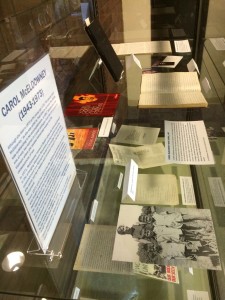
This display of diaries, writings, photographs, and ephemera on the 5th floor of the Healey Library reveals the accomplishments and insights of activist and self-defense educator Carol McEldowney.
University Archives and Special Collections at UMass Boston is excited to unveil several new exhibitions in the Walter Grossmann Gallery on the 5th floor of the Healey Library, all of which highlight materials from the department’s extensive archival holdings. I will describe these new exhibitions in a series of news posts over the next week.
The first exhibition I’d like to highlight, in one of the gallery’s upright display cases, is entitled “‘A PERSONAL MANIFESTO … OF SORTS’: The Diaries of Carol McEldowney” and explores the life of activist, writer, and women’s self-defense educator Carol McEldowney.
Although she died in 1973 at the young age of 30, “the spunky Carol McEldowney,” as she was described by Todd Gitlin in his book The Sixties, was outstanding in her accomplishments. In 1967, McEldowney was one of only two women in a small contingent from the U.S. to travel to Vietnam where she studied Vietnamese society and the consequences of war.
The diary that McEldowney kept during this trip was published by the University of Massachusetts Press in 2007. Elizabeth R. Mock, who co-edited McEldowney’s Hanoi Journal for publication, held several positions in the Healey Library at UMass Boston from 1973 until her retirement in 2010. From 1981 to 2010, Mock was the University Archivist and Curator of Special Collections, having established the archival program for the library. The book is available through the Healey Library here or through the UMass Press here.
In 1971, McEldowney moved to Boston where she immersed herself in the emerging Women’s Movement, playing a central role in the establishment of a Women’s Center in Cambridge. During this time she came out as a lesbian and immersed herself in the Gay Liberation Movement.
From 1971 until the end of her life, McEldowney studied martial arts and taught practical self-defense classes to women and children, becoming one of the founders of the movement to use self-defense for rape prevention. An original contributor to Our Bodies, Ourselves, a source book on women’s health, McEldowney participated in one of the first women’s martial arts exhibitions in the country during International Women’s Day, in 1973, in Boston.
The Carol McEldowney collections in University Archives and Special Collections includes McEldowney’s personal papers relating to her activism, as well as several diaries and journals. The papers range in date from 1960 to 1973.
This exhibition uses selections from the McEldowney’s various diaries and journals – as well as photographs, ephemera, and other writings – to tell the story of a woman at the forefront of anti-war activism and the emerging Women’s and Gay Liberation movements of the late 1960s and early 1970s.
Visit the display in the Grossmann Gallery on the 5th floor of the Healey Library at UMass Boston. The exhibition will run through the spring of 2016.
View the finding aid for the Carol McEldowney collections in University Archives and Special Collections here.
For questions about these collections or to schedule a research appointment, please contact library.archives@umb.edu or 617-287-5469.
University Archives & Special Collections in the Joseph P. Healey Library at UMass Boston collects materials related to the university’s history, as well as materials that reflect the institution’s urban mission and strong support of community service, notably in collections of records of urban planning, social welfare, social action, alternative movements, community organizations, and local history related to neighboring communities.
University Archives & Special Collections welcomes inquiries from individuals, organizations, and businesses interested in donating materials of an archival nature that that fit within our collecting policy. These include manuscripts, documents, organizational archives, collections of photographs, unique publications, and audio and video media. For more information about donating to University Archives & Special Collections, click here or email library.archives@umb.edu.
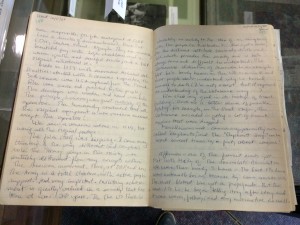
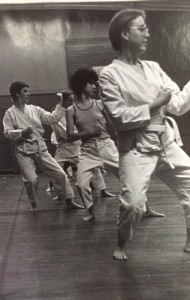
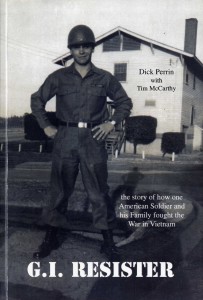

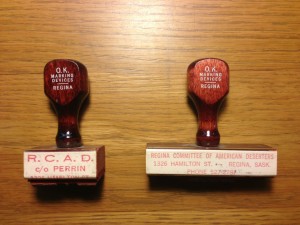
![Campaign flyer for U.S. House of Representatives election. [1998]](https://blogs.umb.edu/archives/files/2015/10/JC-26_VII_f8-1k1olcc-200x300.jpg)
 To celebrate Archives Month, I will be posting highlights from our collections throughout October. I hope that this will turn into a regular series. To learn more about Archives Month, visit the Society of American Archivists
To celebrate Archives Month, I will be posting highlights from our collections throughout October. I hope that this will turn into a regular series. To learn more about Archives Month, visit the Society of American Archivists